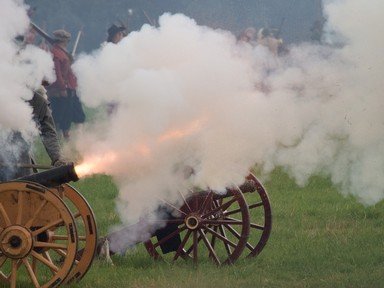Quiz Answer Key and Fun Facts
1. Which was the last battle where a British monarch led his/her troops into battle?
2. This little-known battle during the Korean War prevented the Chinese breaking through to Seoul, but meant the loss of almost an entire regiment - the Glosters.
3. This war saw the only ship (formerly the USS Phoenix) sunk by a nuclear submarine.
4. Winston Churchill once said of this battle, "Before XXX we never had a victory. After XXX we never had a defeat."
5. In 878 the Battle of Ethandun ensured the Vikings were expelled from Wessex by which king?
6. This battle was immortalised with Alfred Lord Tennyson's words; "Theirs not to reason why, theirs but to do and die."
7. Which of these Normandy Beaches did NOT involve British and Commonwealth troops?
8. This battle was preceded by the signal, "England expects that every man will do his duty."
9. This battle in 1704 saw the Duke of Marlborough and his allies march the 250 miles from Bedburg (near Cologne) to the Danube in order to prevent Vienna falling into enemy hands. The Duke was later to name his residence after this battle.
10. This battle in 1415 is the main event in William Shakespeare's "Henry V".
11. This war was code-named Operation Telic by the British and includes the battle honour "Al Basrah".
12. The Duke of Wellington had two horses shot out from under him in this battle and he referred to it as his hardest fought battle.
13. Seen by many to be the turning point in the American War of Independance, this battle in 1777 saw the British under General Burgoyne surrender.
14. This battle in 1879 saw the Zulus wipe out a substantial British force and possibly led to the introduction of "Ammunition Boots" in the British Army.
15. The events before and during this battle are shown in the Bayeux Tapestry, and it was one in the eye for Harold Godwinson.
16. This battle in 1759 saw the death of General James Wolfe and the beginning of the end for New France.
17. This battle in 1746 saw the defeat of Bonnie Prince Charlie. It is the last pitched battle fought on British soil, but is not a battle honour for any British regiment.
18. The opening day of this battle saw the heaviest losses by the British Army in a single day - almost 60,000 casualties.
19. Lt Chard led the British forces in this battle and was one of 11 to win the Victoria Cross.
20. This war was the focal point for novels such as Bravo Two Zero and The One That Got Away and was code-named Operation Granby.
21. This battle in 1815 occured two days after Quatre Bras and saw the final defeat of Napoleon. It has also inspired the naming of a song by ABBA and a major train station in London (not to mention streets, bridges and pubs across Britain). In fiction it sees Richard Sharpe as a Lieutenant-Colonel on the Prince of Orange's Staff and Matthew Hervey as a Cornet in the 6th Light dragoons.
22. This battle in 1485 was arguably the last battle of the Wars of the Roses. It is during this battle that Richard III says (in Shakespeare's play), "A horse! A horse! My kingdom for a horse!"
23. This war at the turn of the 19th-20th century was infamous for the use of concentration camps by the British, who were commanded by Lord Kitchener for most of the war, and saw Robert Baden-Powell become a national hero.
24. This battle in 1645 was the key battle of the English Civil War and saw Sir Thomas Fairfax defeat King Charles I. The Royal Navy ship that was named in honour of the battle was renamed HMS Royal Charles following the Restoration.
25. This battle in 1141 saw King Stephen defeated and captured by the forces of Empress Matilda. A battle by the same name was fought in 1217 between King Henry III and the future King Louis VIII of France.
Source: Author
se01dct
This quiz was reviewed by FunTrivia editor
bloomsby before going online.
Any errors found in FunTrivia content are routinely corrected through our feedback system.


